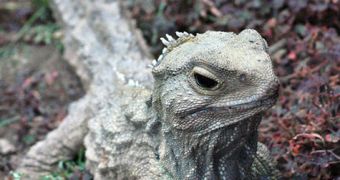Henry is a tuatara that has been living in captivity since 1970, at the Southland Museum, in the New Zealand city of Invercargill. It's currently known that he is 111 years old, and yet, this is the first batch of eggs he's fathered in his life. Although his caretakers have no way of knowing what the very rare lizard has been up to prior to his being captured, this is the first time he has mated in captivity and produced viable eggs. People looking after the animal say that his former disinterest in females of his kind might be explained by a tumor they recently removed from the creature's bottom.
Last July, however, Henry mated with 80 year-old Mildred, and together produced a batch of eggs that has only recently hatched. This is a very important moment for the people at Invercargill, who say that a tuatara birth in captivity is a very rare phenomenon. These animals come directly from a series of species that roamed the Earth alongside dinosaurs, more than 200 million years ago. They are nearly extinct on the planet, and only a few very valuable specimens have endured to this day.
Henry is a fine example of a tuatara's longevity, and everyone at the reservation is very proud of him, especially now that he has produced offspring. Before his surgery, the lizard was very aggressive with female companions, while at the same time remaining idle to everything else. Shortly after his arrival at the park, he began gaining weight, and people started fearing for his life. Finally, following some 40 years in captivity, he managed to shake off his idleness, and is now living alongside three females.
The Museum's tuatara curator, Lindsay Hazley, says that Henry has had a "major personality transplant" following the surgery, and that he now lives "in great harmony" with his companions. "I have done lots of eggs before, but these are just special because they are Henry's," she reveals for the Southland Times newspaper.
These creatures live on average well over 60 years, but documented cases show that some even surpass the 100 mark. Such is the case with Henry, who, at the venerable age of 111, is one of the oldest tuataras known in the world. The reason why their species is so endangered is that they reproduce very slowly, once in 2 to 5 years, and also require tens of years until they are mature enough to mate. Fortunately, Mildred has managed to successfully take care of the 11 eggs she produced, so curators hope to add the baby tuataras to the other 70 "living fossils" the museum currently takes care of.

 14 DAY TRIAL //
14 DAY TRIAL //